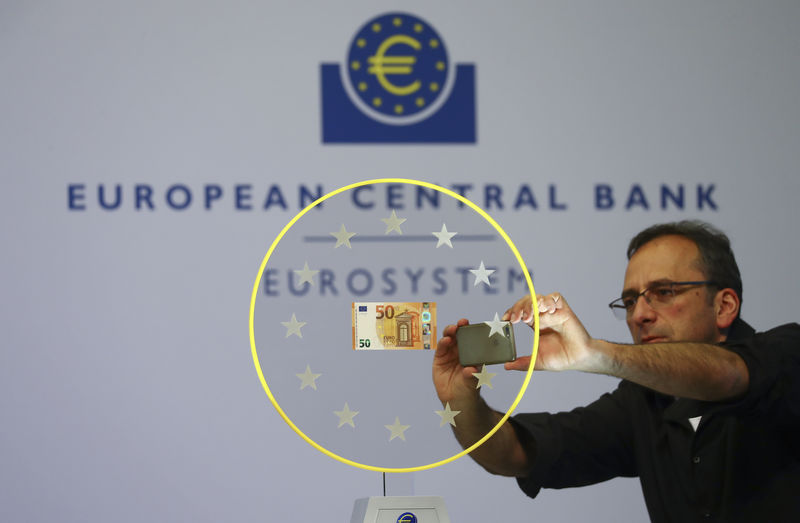(Bloomberg) -- Terms of Trade is a daily newsletter that untangles a world embroiled in trade wars. Sign up here.
European Central Bank officials expressed concern at their latest policy meeting that some observers doubted their ability to restore price stability, prompting the Governing Council to plan for potential fresh monetary stimulus.
Council members broadly agreed that a downward trend in inflation expectations was a cause for concern, and that the euro area’s economic slowdown was likely to be more protracted than expected. While external factors such as trade tensions were driving a contraction in manufacturing, that could be a leading indicator for the services sector, according to the account of the July 24-25 session. Prospects for global trade “remained poor.”
“Communication needed to strike a careful balance between, on the one hand, giving unduly negative signals about the economy and, on the other hand, effectively counteracting the concern among some observers that the Governing Council lacked the necessary instruments to secure the convergence of inflation to its inflation aim over the medium term.”
ECB President Mario Draghi and his colleagues set the stage at the meeting for another round of monetary stimulus to confront the euro area’s weakness. Investors are betting on at least an interest-rate cut on Sept. 12, and some economists predict that large-scale asset purchases will be restarted.
Officials exchanged ideas in July on a list of policy options and how their response should be designed. That included an introduction of mitigating measures, such as tiering system to exempt banks from some of the pain of negative rates. Some policy makers expressed concern that tiering could have “unintended consequences” or not be able to fully offset the impact on sub-zero rates on banks.
At least one member pushed for package of measures such as a combination of rate cuts and asset purchases, saying experience had shown that to be more effective than a sequence of actions. Finnish central banker Olli Rehn has previously called for a significant package of measures that would overshoot market expectations.
The policy discussion underscores the growing sense of urgency among ECB officials that they need to act to help lift the 19-nation bloc out of its doldrums. Germany, the largest economy, is on the edge of recession after a second-quarter contraction, with a report earlier on Thursday showing orders dropping at the fastest pace in six years and factory activity shrinking for an eighth month.
Further risks lie ahead, including the prospect of a disorderly Brexit on Oct. 31 and the possibility that U.S. President Donald Trump will take his trade war directly to Europe.
Fresh ECB easing would come amid a worldwide push to stimulate growth as the global expansion falters under trade tensions. U.S. Federal Reserve Chairman Jerome Powell is expected to use his speech at the central bank symposium in Jackson Hole, Wyoming, on Friday to signal readiness to cut rates again.
Jackson Hole
The minutes from the Fed’s July meeting published on Wednesday showed officials viewed their cut last month as insurance against too-weak inflation and the risk of a deeper slump in business investment.
ECB officials at the meeting again called for governments that have room to spend to use it. They also stressed that the “contingency of significant further deterioration in euro-area economic activity would call for fiscal policy to assume a more prominent role in sustaining demand.”
Germany is considering boosting budget spending if the slump worsens. Finance Minister Olaf Scholz has said he could raise 50 billion euros ($55 billion) if needed -- the same amount as Germany’s package during the global financial crisis.
Limited Headroom
The ECB’s options for adding more monetary stimulus depend on how far it’s willing to burden banks and stretch its own rules. The deposit rate is at minus 0.4% and Draghi has signaled that further reductions would need to come with measures to soften the impact of the policy on banks, who can’t easily pass the charge onto retail depositors.
Reviving the bond-buying program may require some tweaks to self-imposed limits on how much debt from governments it can buy, rules aimed at avoiding distorting the market and breaching laws banning the financing of governments.
The Governing Council will next meet to set policy on Sept. 12 and update their economic projections. That will the penultimate meeting of Draghi’s term, meaning he’ll leave without ever raising interest rates as president.
He’ll step down on Oct. 31, the same day Britain is scheduled to exit from the European Union, leaving former International Monetary Fund chief Christine Lagarde to take over for the next eight years.
